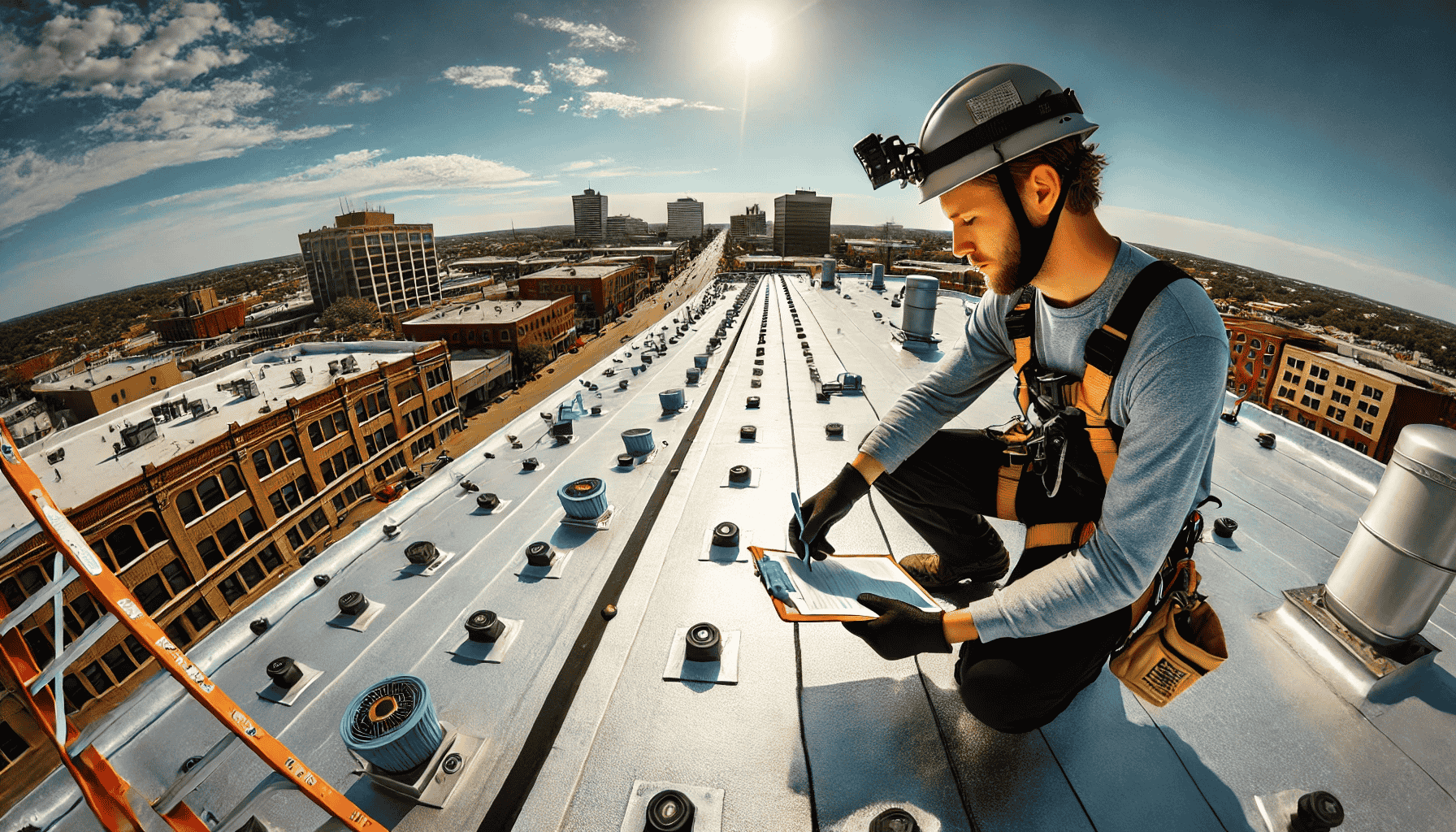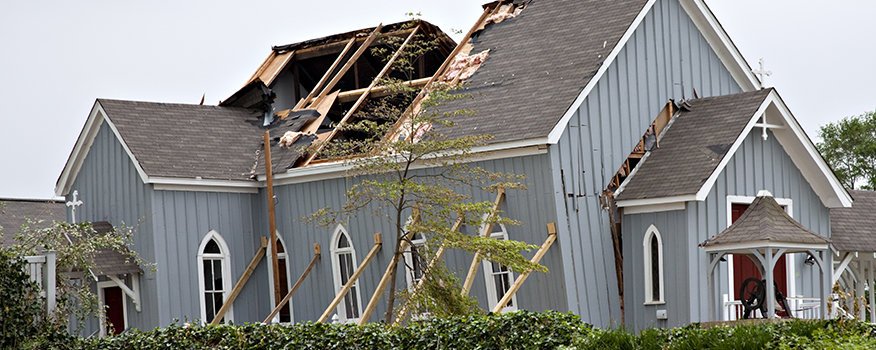Commercial building owners in Wichita face unique challenges when maintaining their properties, especially when it comes to roofing. The city’s climate, characterized by extreme summer heat, severe storms, and frequent hail, puts a lot of strain on roofing systems. These conditions can significantly weaken roof structures over time, leaving them vulnerable to costly damage.
One of the most effective ways to safeguard a commercial roof and extend its lifespan is through regular roof inspections. This article explores why roof inspections are essential for commercial buildings in Wichita, the benefits they offer, how often they should be performed, and the common problems they uncover. Finally, we’ll introduce how Solid Rock Commercial Roofing can provide expert inspection services to protect your investment.
Key Takeaways from
- Wichita’s Climate Puts Roofs at Risk: Extreme heat, severe storms, hail, and freeze-thaw cycles can weaken commercial roofs, making regular inspections crucial to catch weather-related damage early.
- Proactive Maintenance Saves Money: Regular roof inspections help identify small issues before they turn into costly repairs or roof replacements, saving businesses money in the long run.
- Extend Roof Lifespan: Routine inspections ensure the roof is well-maintained, extending its life and keeping it in optimal condition, which also helps preserve warranty coverage.
- Ensure Safety and Liability Protection: Neglecting roof maintenance can lead to structural failures, posing safety risks and increasing liability. Inspections help prevent such hazards.
- Support Insurance Compliance: Keeping up with regular inspections ensures that building owners comply with insurance requirements, which can simplify claims after storms and reduce premiums.
- Advanced Technology Improves Inspections: Tools like drones, infrared scanning, and AI-powered reports enhance inspection accuracy, making it easier to spot hidden damage and predict future issues.
- Solid Rock Commercial Roofing is a Trusted Partner: With expert services tailored to Wichita’s unique climate, Solid Rock provides thorough inspections using cutting-edge technology to protect your roof and investment.
How Wichita’s Climate Impacts Commercial Roofs
Wichita’s unpredictable weather creates a harsh environment for commercial roofs. Each season brings unique challenges:
- Summers are known for intense heat, which causes roofing materials to expand and contract, making them more brittle over time.
- Severe storms during spring and summer, especially hailstorms, can puncture roofing materials, leading to leaks and water damage.
- High winds can loosen or tear roofing membranes and flashing, damaging the roof’s protective layer.
- Winter’s freeze-thaw cycles can create further issues. Water that seeps into cracks can freeze, expand, and worsen the damage.
Understanding how these environmental factors affect roofing materials is key to maintaining a roof. Regular inspections can catch early signs of damage caused by the weather before they escalate into costly repairs or replacements.
Why Regular Roof Inspections Are Essential
Proactive roof inspections are a cost-effective strategy that offers numerous benefits to building owners. Here’s why they’re so important:
1. Preventative Maintenance vs. Costly Repairs
Regular inspections can catch small problems—such as minor leaks, cracks, or loose materials—before they worsen. This saves significant repair costs down the line.
For example, a Wichita business owner might ignore a small leak in their flat roof. Left unaddressed, the leak leads to extensive water damage inside the building, requiring expensive repairs. However, with routine inspections, such issues could have been identified early and repaired at a fraction of the cost.
2. Extending Roof Lifespan
Routine inspections significantly extend the lifespan of commercial roofs. A well-maintained roof can last for decades, while a neglected roof may require a premature replacement due to unaddressed wear and tear.
Additionally, many commercial roofing warranties require regular inspections. Failing to meet this requirement could void the warranty, leaving the owner responsible for the full cost of repairs or replacement.
3. Improving Safety and Reducing Liability
A neglected roof can pose serious safety risks. A sagging roof or one weakened by water damage could collapse, endangering employees and visitors. Regular inspections ensure the roof remains structurally sound, reducing the chances of accidents and the resulting legal liabilities.
4. Insurance Compliance and Benefits
Insurance companies often require proof of regular maintenance. Proper documentation of roof inspections can simplify the claims process in the event of storm damage. In some cases, insurers may offer premium discounts to businesses that commit to regular preventative maintenance.
What’s Involved in a Comprehensive Roof Inspection?
To effectively protect a building, roof inspections must be thorough and cover multiple aspects. Here are the key components of a complete inspection:
1. Visual Inspection
This involves looking for visible signs of damage such as cracks, blisters, water pooling, or punctures. Inspectors will also check for any damage caused by debris or weather, such as torn membranes or displaced materials.
2. Structural Review
Inspectors examine the roof’s structural integrity, focusing on areas like seams, flashings, and fasteners. Ensuring that the roof is secure and can handle its load is crucial for preventing further damage.
3. Drainage System Assessment
A roof’s drainage system plays a key role in preventing water damage. Inspectors will check that gutters, downspouts, and internal drains are free from blockages and functioning properly. Poor drainage can lead to water pooling, which weakens roofing materials and increases the risk of leaks.
4. Energy Efficiency and Insulation Check
Inspectors evaluate the roof’s insulation to ensure it is intact and energy-efficient. In Wichita’s extreme summer heat, this is especially important, as poor insulation can lead to higher energy costs for heating and cooling.
5. Roof Penetrations
Areas where vents, HVAC systems, and skylights penetrate the roof are prone to leaks. Inspectors check that these areas are properly sealed and protected from water infiltration.
How Often Should Roof Inspections Be Performed?
Several factors determine the frequency of roof inspections. However, there are some general guidelines to follow:
1. Seasonal Inspections
Roofs should be inspected at least twice a year—once in the spring, after winter weather, and once in the fall, before winter sets in. These seasonal inspections help address any damage caused by storms, high winds, or extreme temperatures.
2. Post-Storm Inspections
After any severe weather event, such as a hailstorm or high winds, it’s essential to have the roof inspected. Even small issues, if left unaddressed, can lead to much larger problems.
3. Inspections Based on Roof Age
Older roofs tend to experience more issues and should be inspected more frequently. If a roof is approaching the end of its expected lifespan (typically 15–20 years for many commercial roofs), inspections should be conducted every few months.
4. Roof Type
The type of roofing system also affects how often inspections are needed. Flat roofs, for example, are more prone to water pooling and may require more frequent inspections than sloped roofs.
Common Problems Detected During Inspections
While each building and roof are unique, some issues are frequently uncovered during routine inspections:
1. Leaks and Water Damage
Leaks often develop due to weak spots in the roofing material or poor drainage. If left untreated, these leaks can cause mold, interior damage, and structural issues.
2. Membrane Damage
Flat roofs commonly feature membrane systems such as TPO or EPDM. These membranes can be punctured by debris or worn down over time. Regular inspections help identify early signs of membrane damage before it escalates.
3. Blistering and Cracking
Blistering occurs when air or moisture becomes trapped under the roofing material, while cracking indicates aging or weather-related stress. Both issues can compromise the roof’s waterproofing ability.
4. Debris Accumulation
Leaves, dirt, and other debris can clog drains and gutters, leading to water pooling. Regular cleaning and inspections help prevent drainage problems and the damage caused by standing water.
Leveraging Technology for More Efficient Roof Inspections
Innovative technology has transformed how roof inspections are conducted, making them safer and more accurate:
1. Drone Inspections
Drones provide a bird’s-eye view of the roof, enabling inspectors to assess large areas quickly and safely. This technology is particularly useful for hard-to-reach places or when inspecting large commercial roofs.
2. Infrared Scanning
Thermal imaging technology can detect hidden problems, such as water leaks or insulation issues, that may not be visible to the naked eye. By measuring temperature variations, infrared scans help identify energy loss and moisture infiltration.
3. AI-Powered Reports
AI technology can analyze historical data from previous inspections, helping predict future maintenance needs. For example, AI can detect patterns of wear and tear specific to buildings in Wichita’s climate, allowing owners to proactively address potential problems.
Long-Term Benefits of Regular Roof Inspections
The long-term advantages of regular roof inspections far outweigh the cost. Here are some key benefits:
1. Significant Cost Savings
By identifying and fixing small problems early, inspections can help avoid expensive emergency repairs or full roof replacements.
2. Extending Roof Lifespan
Well-maintained roofs last much longer. Regular inspections ensure that issues are addressed before they lead to premature roof failure, saving money in the long term.
3. Energy Efficiency
A well-maintained roof with proper insulation helps regulate building temperatures, reducing heating and cooling costs. This is especially valuable during Wichita’s hot summers when energy bills tend to rise.
Conclusion: Solid Rock Commercial Roofing—Your Partner in Roof Inspections
Regular roof inspections are critical to maintaining the health and longevity of your commercial roof. In a climate like Wichita’s, where extreme weather can cause significant wear and tear, these inspections offer peace of mind and prevent costly surprises.
At Solid Rock Commercial Roofing, we’re dedicated to helping you protect your investment. Our experienced team uses cutting-edge technology, including drones and infrared scanning, to perform thorough inspections that address every potential issue. We tailor our services to meet the unique needs of your building, ensuring your roof remains in excellent condition year-round.
Don’t wait until a small problem becomes a major expense. Schedule a comprehensive roof inspection with Solid Rock Commercial Roofing today. Protect your investment, extend the life of your roof, and maintain the safety and efficiency of your building. Contact us for a free consultation and start your proactive roof maintenance plan now.
FAQs: Regular Roof Inspections for Wichita Commercial Buildings
Why are regular roof inspections necessary for commercial buildings?
Regular roof inspections help identify and fix small problems before they become costly repairs. They extend the roof’s lifespan, ensure safety, and maintain compliance with warranties and insurance requirements.
How often should I have my commercial roof inspected?
It’s recommended to have your roof inspected at least twice a year: once in the spring and once in the fall. Additionally, roofs should be inspected after severe weather events like hailstorms or high winds.
What are the common signs of roof damage found during an inspection?
Common issues include leaks, water damage, cracks, punctures, loose flashing, poor drainage, and membrane damage. Inspections also check for debris accumulation that could clog drainage systems.
What happens during a typical roof inspection?
Inspectors visually examine the roof for damage, assess the structural integrity of seams and flashings, check drainage systems for blockages, evaluate insulation efficiency, and inspect roof penetrations such as vents or skylights for proper sealing.
Can I inspect my commercial roof myself?
While you can perform basic checks for visible damage, professional inspectors have the experience and tools (like drones and infrared scanners) to detect hidden issues and perform a thorough assessment that meets warranty and insurance standards.
How do roof inspections help save money?
Regular inspections help catch small issues before they escalate into larger, more expensive problems. By addressing issues early, you avoid costly repairs or roof replacements. Proper maintenance also reduces energy costs by improving insulation and prevents damage to the building’s interior.
What kind of technology is used in modern roof inspections?
Advanced technology, such as drones, infrared thermal scanners, and AI-powered reporting systems, is used to inspect large or hard-to-reach areas, detect hidden issues like water leaks, and provide detailed analysis for better maintenance planning.
What are the benefits of hiring Solid Rock Commercial Roofing for inspections?
Solid Rock Commercial Roofing offers expert services tailored to Wichita’s climate. Our team uses cutting-edge technology, like drones and thermal imaging, to provide thorough, accurate inspections that protect your roof and investment.
What should I do if my roof is damaged after a storm?
Schedule a post-storm roof inspection immediately. Prompt action helps identify and repair damage before it worsens, and ensures that you have the necessary documentation for insurance claims.
How can I schedule a roof inspection with Solid Rock Commercial Roofing?
To schedule an inspection, contact Solid Rock Commercial Roofing via phone or visit our website to arrange a free consultation and inspection tailored to your building’s specific needs.
This article has been a collaboration between Rusty Cryer and OpenAI’s ChatGPT. Created on October 11, 2024, it combines AI-generated draft material with Cryer’s expert revision and oversight, ensuring accuracy and relevance while addressing any AI limitations.




